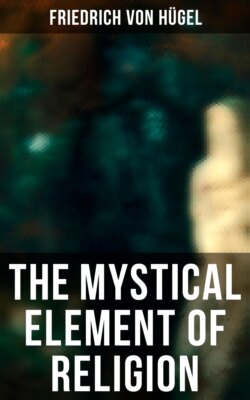Читать книгу The Mystical Element of Religion - Friedrich von Hügel - Страница 46
На сайте Литреса книга снята с продажи.
1. The three constituents of Knowledge.
ОглавлениеEven the most elementary acquisition, indeed the very possibility, of any and all certitude and knowledge, is dependent for us upon the due collaboration of the three elements or forces of our nature, the sensational, the rational, the ethico-mystical.[36]
There is, first, in the order of our consciousness and in the degree of its undeniableness, the element of our actual impressions, the flux of our consciousness as it apprehends particular sights and sounds, smells and tastes and touches; particular sensations of rest and movement, pleasure and pain, memory, judgment, and volition, a flux, “changeless in its ceaseless change.” We have so far found neither a true object for thought, nor a subject which can think. And yet this element, and this alone, is the simply, passively received, the absolutely undeniable part of our experience,—we cannot deny it if we would. And again, it is the absolutely necessary pre-requisite for our exercise or acquisition, indeed for our very consciousness, of the other two means or elements, without which there can be no real knowledge.
For there is, next in the logical order of the analysis of our consciousness and in the degree of its undeniableness, the element of the various forms of necessary thought, in as much as these are experienced by us as necessary. We can, with Aristotle, simply call them the ten categories; or we can, with greater precision and extension, group them, so far with Kant, under the two main heads of the two pure “aesthetic” Perceptions of time and space, on the one hand; and of the various “analytic” Forms of judgment and of the Categories of Unity, Reality, Substance, Possibility, etc., on the other hand. Now it can be shown that it is only by means of this whole second element, only through the co-operation of these “perceptions” and forms of thought, that any kind even of dim feeling of ordered succession or of system, of unity or meaning, is found by our mind in that first element. Only these two elements, found and taken together, present us, in their interaction, with even the impression and possibility of something to reason about, and something wherewith to reason.
The second element then differs from the first in this, that whereas the first presents its contents simply as actual and undeniable, yet without so far any necessity or significance: the second presents its contents as both actual and necessary. By means of the first element I see a red rose, but without any feeling of more than the fact that a rose, or at least this one, is red; it might quite as well be yellow or blue. By means of the second element, I think of a body of any kind, not only as actually occupying some particular space and time, but as necessarily doing so; I feel that I must so think of it.
And yet there is a third and last element necessary to give real value to the two previous ones. For only on the condition that I am willing to trust these intimations of necessity, to believe that these necessities of my subjective thought are objective as well, and correspond to the necessities of Being, can I reach the trans-subjective, can I have any real knowledge and experience of anything whatsoever, either within me or without. The most elementary experience, the humblest something to be granted as really existing and as to be reasoned from, is thus invariably and inevitably composed for me of three elements, of which only the first two are directly experienced by me at all. And the third element, the ethico-mystical, has to be there, I have to trust and endorse the intimations of necessity furnished by the second element, if anything is to come of the whole movement.
Thus, here also, at the very source of all our certainty, of the worth attributable to the least or greatest of our thoughts and feelings and acts, we already find the three elements: indubitable sensation, clear thought, warm faith in and through action. And thus life here already consists of multiplicity in unity; and what in it is absolutely indubitable, is of value only because it constitutes the indispensable starting-point and stimulation for the apprehension and affirmation of realities not directly experienced, not absolutely undeniable, but which alone bear with them all the meaning, all the richness, all the reality and worth of life.
